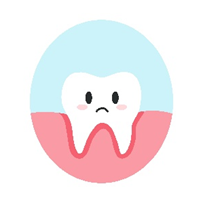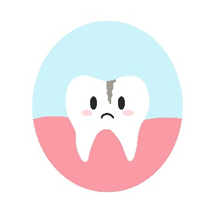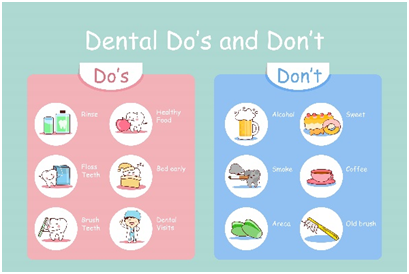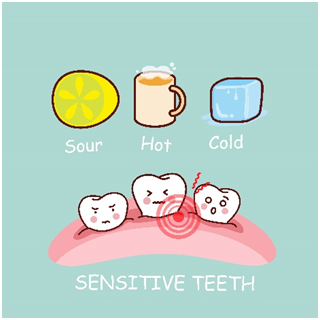Sensitive teeth occur when the underlying layer of your teeth — the dentin — becomes exposed. This can happen due to erosion (wear and tear) and gum recession (when your gum tissue pulls away from your teeth, exposing the roots).
Dental sensitivity can also be a symptom of other issues, including cavities, gum disease or a cracked tooth.
Causes of Sensitive Teeth
Many factors can lead to the development of sensitive teeth, including:
Brushing too hard: Over time, brushing too hard can wear down enamel and cause the dentin to be exposed.
cause the dentin to be exposed.
Gum recession: Some people are genetically prone to thin gum tissue. Other people develop gum recession as a result of periodontal disease.
Gum disease: Inflamed and sore gum tissue may cause sensitivity because of the loss of supporting ligaments, which exposes the root surface that leads directly to the nerve of the tooth.
Cracked teeth: Chipped or broken teeth may fill with bacteria from plaque and enter the pulp, causing inflammation.
enter the pulp, causing inflammation.
Teeth grinding: Grinding or clenching your teeth may wear down the enamel and expose underlying dentin.
Teeth whitening products: These products are major contributors to teeth sensitivity. If you want to brighten your smile, talk to a dentist about teeth whitening for sensitive teeth.
Age: Teeth sensitivity is highest between the ages of 25 and 30.
Acidic foods: Regular consumption of foods with a high acid content, such as citrus fruits, tomatoes, pickles and tea, can cause enamel erosion.
citrus fruits, tomatoes, pickles and tea, can cause enamel erosion.
Recent dental procedures: People can get sensitive teeth after fillings, teeth cleanings and dental restoration placement. Sensitivity caused by dental procedures is temporary and usually disappears in four to six weeks.
Can sensitive tooth pain go away?
Yes. In some cases, teeth sensitivity goes away on its own — especially if it’s due to a recent dental procedure, such as a filling or root canal. If you have teeth sensitivity that lingers and doesn’t go away, talk to a dentist. You might have worn enamel or exposed teeth roots. In these cases, you might need treatment to address the issue.
Whether you need treatment depends on the cause. You can address mildly sensitive teeth with desensitizing toothpaste and good oral hygiene. Severe teeth sensitivity caused by gum recession, cavities or cracked teeth may require treatment. Your dentist can help determine what’s causing your sensitive teeth and recommend treatment to address the issue.
If you have any questions or would like any further information about the causes and treatment of sensitive teeth do not hesitate to call Valley Dental Practice on 01255 220322 and book a consultation today.





